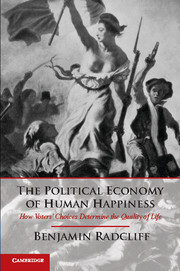Book contents
- Frontmatter
- Contents
- Acknowledgments
- Introduction
- 1 The Democratic Pursuit of Happiness
- 2 Market Democracy
- 3 Citizens or Market Participants?
- 4 The Scientific Study of Happiness
- 5 The Size of the State
- 6 Labor Unions and Economic Regulation
- 7 The American States
- 8 Between Market and Morality
- References
- Index
7 - The American States
Published online by Cambridge University Press: 05 March 2013
- Frontmatter
- Contents
- Acknowledgments
- Introduction
- 1 The Democratic Pursuit of Happiness
- 2 Market Democracy
- 3 Citizens or Market Participants?
- 4 The Scientific Study of Happiness
- 5 The Size of the State
- 6 Labor Unions and Economic Regulation
- 7 The American States
- 8 Between Market and Morality
- References
- Index
Summary
This chapter completes the empirical analysis of the political determinants of life satisfaction by shifting geographical focus from the universe of industrial democracies to domestic politics in the United States. Whereas I previously attempted to deduce the consequences of different public policy regimes for quality of life by searching for statistical relationships between these phenomena over countries, I here attempt to find similar evidence when considering only variation across the states of the American federal system. The initial rationale for this strategy is simple enough: this approach allows tests of my basic propositions about the effects of the welfare state, economic regulation, and organized labor using data of an entirely different sort. If these data confirm prior results, this can only improve our confidence in them.
There are, however, particulars that make this extension of the analysis an especially fruitful one. First, by concentrating entirely on a single country, we hold literally constant various cultural, social, and historical aspects of a nation that we controlled for only econometrically in the cross-national study. Although those controls should be more than sufficient for isolating the relationships in question, any refinement in the method of control can, again, only further confirm and extend the earlier findings. While there are certainly cultural variations across regions of the United States, these fade into triviality compared to the differences one observes across countries as disparate as France, Sweden, Ireland, New Zealand, and Japan. This is doubly so since the Second World War, where the sometimes lamented “nationalization” (or “homogenization”) of culture has further eroded what vestigial regional differences in sociocultural patterns existed in a country that has been since the Civil War undeniably a single country, with a single history and culture, at least in comparison to the differences between countries that have previously concerned us.
- Type
- Chapter
- Information
- The Political Economy of Human HappinessHow Voters' Choices Determine the Quality of Life, pp. 159 - 176Publisher: Cambridge University PressPrint publication year: 2013



